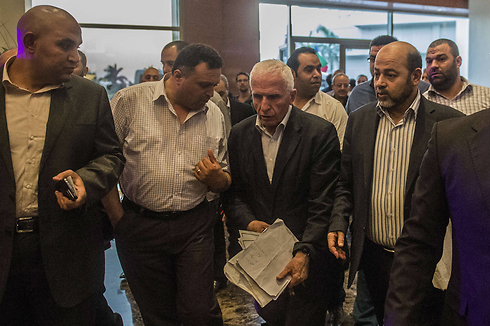
Throughout the course of Operation Protective Edge, the IDF has provided the political echelon with a significant handful of notable achievements.
The first of these was the performance of the Iron Dome missile defense system, which provided almost hermetic protection for Israel's civilian population.
The second was the decimation of Hamas: Two strategic capabilities devised and perfected by the organization – the rocket arsenal and the network of attack tunnels – have been drastically reduced.
Hamas has also emerged more battered and bruised than ever, wounded and bleeding on the battlefield, stripped of all ability to protect the people of Gaza, who paid the heaviest price on the other side.
Neither Hezbollah nor Iran felt the urge to come to Hamas' aid. They shied away from joining the fray in Gaza, giving paltry excuses for their betrayal of the "Palestinian uprising", without once mentioning the real underlying reason: The IDF's deterrence capability along the northern border, which has proven to be truly effective.
Hamas and its partners in Gaza were dragged to Cairo under the most difficult of political circumstances. Their demand for negotiations under fire was denied, with Israel successfully dictating the opening terms of the talks. The organization's political leaders - Ismail Haniyeh in Gaza and Khaled Mashal sitting in exile in Qatar - were denied entry to Egypt to participate in the negotiations, and Hamas had to make do with a delegation headed by a member of the Palestinian Authority. But above all, Hamas had to genuflect to the new Egyptian leadership, which had banned it as a terrorist organization.
Hamas failed completely in its attempt to bring its last two remaining friends, Turkey and Qatar, into the negotiations, even though this request had initially won American understanding. Defeat followed defeat.
And still, despite Israel's demonstrable achievements on the battlefield and visible success in the political domain, Operation Protective Edge is not yet over. At the time of writing, it is still unclear whether the talks in Cairo will result in an agreement, if the fighting will resume or whether the ceasefire will hold if there is no decision. But how has this situation come about?
For all that has been said about Hamas' heavy military and political losses, it has remained on its feet long enough to present itself as a challenging opponent to Israel in Cairo. For all its inferior and trampled down status, its blatant isolation, Hamas is still deeply rooted in the Gaza Strip, and the attempt to "clone" the Palestinian political landscape and recreate the PLO on the backs of Hamas in Gaza is simply unfeasible.
The agreement reached in the Cairo talks will lead over time to Israeli recognition of Hamas as a legitimate player in the Israeli-Palestinian equation. This would be a significant step towards genuine Israeli acceptance of the existence of the Palestinian unity government, and an understanding that despite the achievements of Operation Defensive Shield more than a decade ago, Hamas is still alive and sometimes kicking in Judea and Samaria.
The government is reluctant to take a similar military route again, and so its messages to the public primarily emphasize the security dimension of the Cairo talks.
Hamas wants to emerge from this conflict war with an achievement that would justify to the residents of Gaza the decision by Mohammed Deif and his friends to wage war against Israel for more than a month, causing massive destruction to Gaza. As such, the organization is very eager to end the fighting at this point.
If no agreement is reached in Cairo, it means that Israel intends to return to battlefield sooner or later to try to finish the task of destroying Hamas in the tunnels burrowed under Shifa Hospital.
A ceasefire without an agreement would signal that the IDF had not made solid enough achievements on the battlefield. The Arab world would then interpret that to mean that while Israel had won the battle, it had lost the war - and in effect, had managed to turn its successes on the battlefield into failure at the negotiating table.
This would also be the final nail in the coffin of the Palestinian Authority, whose already shaky status to would be irredeemably damaged. A conclusion such as this to Protective Edge would also mean the start of the emergence of a single state - from the river to the sea.
















